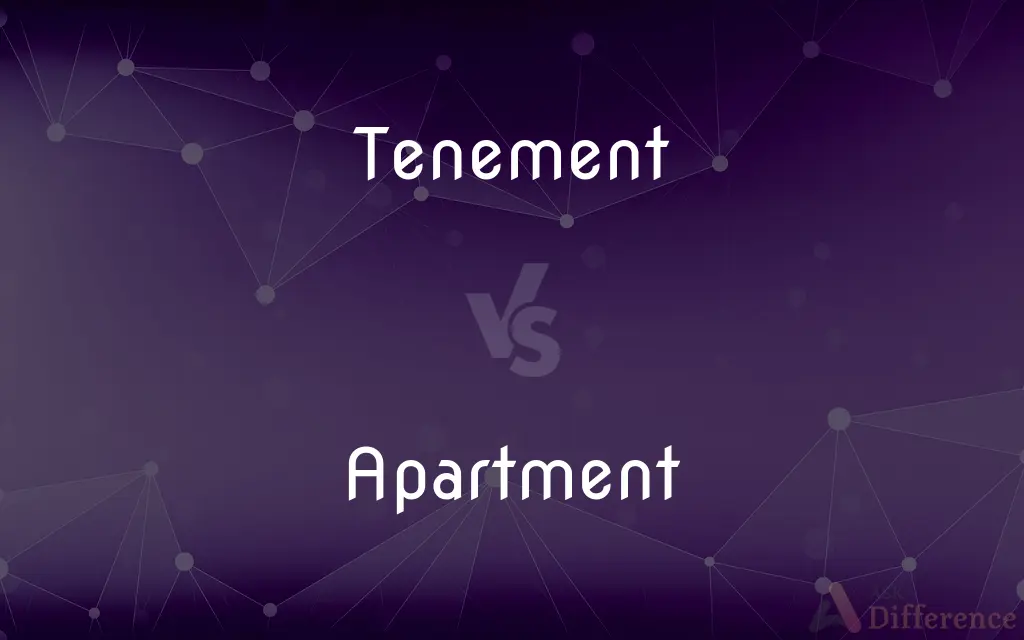Tenement vs. Apartment — What's the Difference?
Edited by Tayyaba Rehman — By Urooj Arif — Updated on March 18, 2024
A tenement is a multi-occupancy building of any sort, often associated with lower-income housing, while an apartment refers to a self-contained unit within a larger complex.

Difference Between Tenement and Apartment
Table of Contents
ADVERTISEMENT
Key Differences
Tenements historically signify multi-family buildings with basic amenities, often in urban centers and linked with lower socio-economic groups. These buildings may be older and less maintained, characterized by their high occupancy and sometimes poor living conditions. In contrast, apartments denote a broad category of residential units found within a building or complex, offering a range of amenities and living standards. Apartments can cater to various income levels, from luxury to more affordable options, and are typically designed with privacy and modern living in mind.
While tenements are often associated with crowded living conditions and fewer amenities, emphasizing the need for affordable housing solutions, apartments vary widely in size, luxury, and amenities, reflecting a wider range of living standards and preferences. This distinction highlights the socio-economic implications of urban housing, where tenements often serve as a critical but challenging aspect of the housing spectrum.
The evolution of tenements has seen efforts to improve living conditions and integrate these buildings more effectively into urban renewal projects. This includes refurbishing older buildings and enhancing community services, thereby improving the quality of life for residents. Meanwhile, the development of apartment complexes continues to evolve, with a focus on sustainability, community living, and innovative amenities that cater to the diverse needs of urban dwellers.
The legal and regulatory aspects of tenements and apartments differ significantly across regions, affecting tenants' rights, building codes, and ownership structures. For instance, tenements may be subject to specific regulations aimed at protecting tenants' rights and ensuring habitable living conditions, whereas apartment regulations might focus more on zoning, safety standards, and the provision of amenities.
In terms of cultural representation, tenements have played a significant role in the narrative of urban development and migration, often depicted as the first homes for newly arrived immigrants. They are symbols of the struggles and aspirations of lower-income urban populations. Apartments, meanwhile, are represented in a variety of contexts, from the aspirational lifestyles in luxury apartments to the communal living of middle-class complexes, showcasing the diverse social fabric of cities.
ADVERTISEMENT
Comparison Chart
Definition
Multi-occupancy building often associated with lower-income housing.
Self-contained housing unit in a larger complex.
Historical Context
Originated in urban centers as basic, affordable housing for immigrants and the working class.
Can vary from luxury to affordable, catering to a wide range of socio-economic statuses.
Amenities
Generally fewer amenities, focusing on basic living needs.
Range from minimal to luxury amenities, depending on the apartment type.
Living Conditions
Often characterized by high occupancy and lower living standards.
Living standards vary widely, often higher and with more privacy than tenements.
Socio-economic Association
Linked with lower socio-economic groups.
Caters to a broad socio-economic spectrum.
Compare with Definitions
Tenement
Characterized by minimal amenities and basic accommodations.
The tenement's lack of proper heating systems made winters particularly harsh.
Apartment
Can range from studio layouts to multi-bedroom units, offering various amenities.
The new apartment complex features a gym, pool, and rooftop garden.
Tenement
A building divided into multiple dwelling units, often in urban areas.
The tenement housed several families, each crammed into small, adjacent units.
Apartment
Associated with contemporary living and privacy within urban settings.
Their apartment offered a quiet retreat from the city's hustle and bustle.
Tenement
Can signify buildings needing significant maintenance or renovation.
The old tenement, with its peeling paint and creaky floors, stood as a reminder of the area's history.
Apartment
A self-contained housing unit located within a larger building or complex.
They moved into an apartment with a great view of the city skyline.
Tenement
Historically, a type of residence that accommodated working-class families at a low cost.
Immigrant communities often found their first homes in city tenements.
Apartment
Often part of developments catering to different lifestyles and income levels.
Luxury apartments downtown are attracting young professionals with their modern amenities.
Tenement
Associated with dense, sometimes overcrowded living conditions.
The narrow hallways of the tenement were always bustling with the sounds of its many inhabitants.
Apartment
Reflects a broad spectrum of architectural styles and living standards.
The Art Deco apartment building is a landmark in the neighborhood.
Tenement
A tenement is a type of building shared by multiple dwellings, typically with flats or apartments on each floor and with shared entrance stairway access, on the British Isles notably common in Scotland. In the medieval Old Town, in Edinburgh, tenements were developed with each apartment treated as a separate house, built on top of each other (such as Gladstone's Land).
Apartment
An apartment (American English), or flat (British English, Indian English, South African English), is a self-contained housing unit (a type of residential real estate) that occupies only part of a building, generally on a single story. There are many names for these overall buildings, see below.
Tenement
A building for human habitation, especially one that is rented to tenants.
Apartment
A flat, typically one that is well appointed or used for holidays
Self-catering holiday apartments
Tenement
A rundown, low-rental apartment building whose facilities and maintenance barely meet minimum standards.
Apartment
A room or suite of rooms designed as a residence and generally located in a building occupied by more than one household.
Tenement
Chiefly British An apartment or room leased to a tenant.
Apartment
An apartment building
A row of high-rise apartments.
Tenement
(Law) A property of a permanent nature that is possessed or owned, such as land or a building, along with the rights associated with such possession or ownership.
Apartment
A room.
Tenement
A building that is rented to multiple tenants, especially a low-rent, run-down one.
Apartment
Apartments Chiefly British A suite of rooms within a larger building set aside for a particular purpose or person.
Tenement
(legal) Any form of property that is held by one person from another, rather than being owned.
The island of Brecqhou is a tenement of Sark.
Apartment
A complete domicile occupying only part of a building, especially one for rent; a flat.
Apartment dwellers
Tenement
(figurative) Dwelling; abode; habitation.
Apartment
(archaic) A suite of rooms within a domicile, designated for a specific person or persons and including a bedroom.
Tenement
That which is held of another by service; property which one holds of a lord or proprietor in consideration of some military or pecuniary service; fief; fee.
Apartment
(obsolete) A division of an enclosure that is separate from others; a compartment
Tenement
Any species of permanent property that may be held, so as to create a tenancy, as lands, houses, rents, commons, an office, an advowson, a franchise, a right of common, a peerage, and the like; - called also free tenements or frank tenements.
The thing held is a tenement, the possessor of it a "tenant," and the manner of possession is called "tenure."
Apartment
A conceptual space used for separation in the threading architecture. Objects in one apartment cannot directly access those in another, but must use a proxy.
Tenement
A dwelling house; a building for a habitation; also, an apartment, or suite of rooms, in a building, used by one family; often, a house erected to be rented.
Apartment
A room in a building; a division in a house, separated from others by partitions.
Tenement
Fig.: Dwelling; abode; habitation.
Who has informed us that a rational soul can inhabit no tenement, unless it has just such a sort of frontispiece?
Apartment
A set or suite of rooms.
Tenement
A tenement house.
Apartment
A compartment.
Tenement
A rundown apartment house barely meeting minimal standards
Apartment
A room or suite of rooms in a building comprising a dwelling unit separate from others in the building, and typically having its own separate bath, sanitary, and kitchen facilities. Such apartments are in most cases rented from the owner by those dwelling in them.
Apartment
A suite of rooms usually on one floor of an apartment house
Common Curiosities
Can an apartment be considered a tenement?
While the terms have distinct connotations, an apartment in a low-income, densely populated building could be considered a tenement.
What amenities are typically found in apartments but not in tenements?
Apartments may offer amenities like gyms, swimming pools, and concierge services, which are usually not found in tenements.
Are tenements still common today?
Yes, tenements still exist, particularly in older urban areas, though many have been renovated or are subject to urban renewal efforts.
How do living conditions in tenements compare to those in apartments?
Living conditions in tenements are often more cramped and less maintained compared to apartments, which can range from basic to luxurious.
What is the main difference between a tenement and an apartment?
A tenement is a type of building known for its high occupancy and basic living conditions, often associated with lower-income housing, whereas an apartment is a self-contained unit that can vary widely in terms of size, amenities, and price.
Is there a legal difference between a tenement and an apartment?
Legal definitions can vary by region, but tenements may be subject to specific regulations aimed at improving living conditions for lower-income residents.
How do socio-economic factors influence whether a building is classified as a tenement or an apartment?
Socio-economic factors play a significant role, with tenements generally housing lower-income populations, while apartments cater to a broader economic spectrum.
How do the architectural styles of tenements and apartments differ?
Tenements often feature older, more utilitarian designs, while apartments can range from historic to modern architectural styles.
How does the maintenance and upkeep compare between tenements and apartments?
Apartments, especially in higher-end complexes, often receive more regular maintenance and updates than tenements.
What historical role have tenements played in cities?
Tenements have historically provided affordable housing options for immigrants and the working class, playing a key role in urban development.
Can tenements be found outside of urban areas?
While traditionally associated with urban centers, the concept of tenements can apply to any densely populated, lower-income housing area.
What are the typical lease terms for tenements vs. apartments?
Lease terms can vary widely but are generally similar for both tenements and apartments, depending on the landlord and local regulations.
Share Your Discovery

Previous Comparison
Article vs. Document
Next Comparison
Incense vs. FrankincenseAuthor Spotlight
Written by
Urooj ArifUrooj is a skilled content writer at Ask Difference, known for her exceptional ability to simplify complex topics into engaging and informative content. With a passion for research and a flair for clear, concise writing, she consistently delivers articles that resonate with our diverse audience.
Edited by
Tayyaba RehmanTayyaba Rehman is a distinguished writer, currently serving as a primary contributor to askdifference.com. As a researcher in semantics and etymology, Tayyaba's passion for the complexity of languages and their distinctions has found a perfect home on the platform. Tayyaba delves into the intricacies of language, distinguishing between commonly confused words and phrases, thereby providing clarity for readers worldwide.
















































